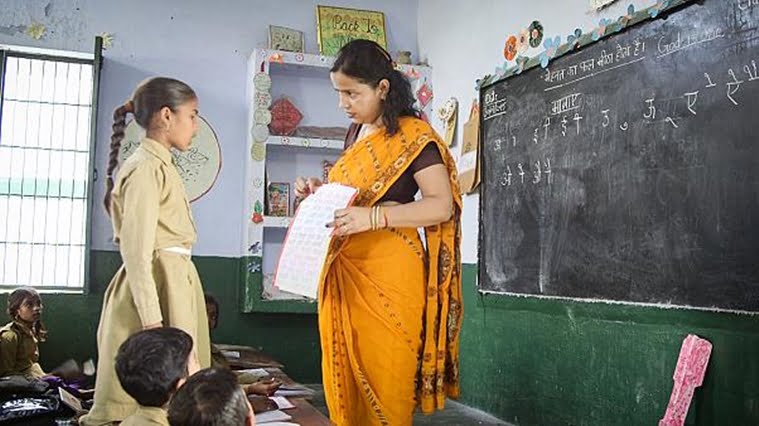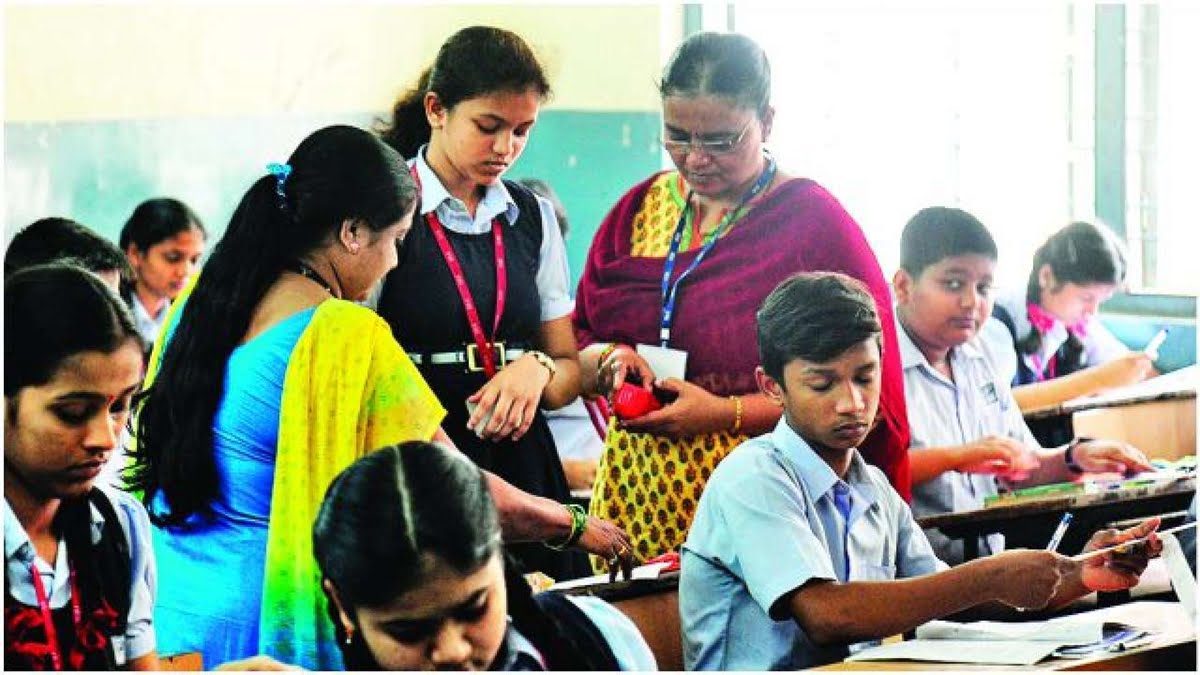I cannot get the picture of that schoolteacher who cut the vegetables while invigilating a class examination out of my mind. I remember my music teacher knitting sweaters, her daughter’s class assignment, in our class. While I was not anyway destined to become a vocalist, how unprofessional of these women to bring their homes into their workplaces, right? Isn’t the separation between work and home supposed to be tangible and final?
The images of these women – the school teachers several of us had an intense dislike towards – have been haunting me. I am writing this, to give my female teachers the benefit of the doubt and reflect on our shared womanhood.
Soon, in this lockdown I found myself chopping vegetables during an office conference call. I did it because I had to, and I did not think that it affected my productivity in any way. And it is since then, that the images of these women – the school teachers several of us had an intense dislike towards – have been haunting me. I am writing this, to give my female teachers the benefit of the doubt. At this instance, I want to do nothing but empathise with them. I want to reflect on our shared womanhood.
I went to a nice all girls’ convent school. Those that definitely do not have the classrooms you feel nostalgic for, while watching teen American rom-coms. In my school, you did not lose any points for being nerdy and sedentary. Instead, I remember my teachers would shame girls who actively participated in sports, taunting them that they would certainly be a failure in life if they would not attend to their academics more seriously. In my meritocratic zeal, I looked at my thus ‘academically lesser’ classmates with patronising pity, while helping them with notes and other material. How proud I felt, for being the person who was at her homework during the ‘zero’ period. However, that meritocracy fell to its face as we grew up. Some of us who donned a ‘woke’ avatar, discussed the whole idea of merit time and again.

Also read: Dear Teachers, I Refuse To Be Your Standard ‘Good Girl’
The subtext of any moral lesson in a girls’ school is more about being a good girl than just a good person. My English teacher, whom I remember rather fondly for teaching us gerunds and voices, once announced: “Only ugly girls wear make-up.” The schism between the girls who put on make-up and who do not was perfected through constant nudges and punishments for wearing kajal or cutting hair into fringes. None of us stood up and asked: “Why?” We were conditioned to be brought completely into the narrative. The same teacher, who ironically also taught us an abridged version of Romeo and Juliet, told us that love as talked about in these stories is merely a figment of fiction. “Girls should not chase this illusionary thing.” They should rather accept their parents’ choice as they know the best for their daughters. In retrospect, I think she probably meant the best for us. Probably, she was arrested in her own catholic morality. Maybe she was trying to keep us away from troubles and struggles. Maybe she wanted us to focus on our studies, because something as normal as a crush one harbours in their teenage – was seen as a grave distraction from studies.
My Biology teacher had once declared: “Most of you are going to end up here in this city as nothing more than housewives or as teachers somewhere in the city schools.” I have been mentally trying to unpack her statement for a while. Did she say that out of spite? Did she say it in a matter-of-fact manner? Was she stating a conclusion,emerging from her years of experience? Do women ‘end up’ as housewives? Is this city unliveable? However, the question that seems most important to me is the irony latent in the factum of being a teacher. In our city, hardly any women ‘worked’, so to say. I mean, of course, all women worked but not all of them were categorised as “working women”.
As thoroughly misplaced the term was, these female teachers were in fact, the first working women we knew. Some of them even drove their own vehicles as they entered the school campus. Many of them beamed with pride on the fact that they are the first ones in their family to “work”. But hardly any of us ever gave a second thought to making a career in education. As intellectually stimulating this field of inquiry was, there was a certain sense of defeat in it. These vehicle-driving, English-speaking, working women often thought that we would end up like them. We, meanwhile, definitely did not want to end up as our teachers or mothers, we assured ourselves!
Many of my former classmates have now married, staying with their families in far-away-cities, some working as teachers, others as homemakers. I often wonder if they think that the state that they are now in – is one of ‘ended up-ness’? I hope they don’t. I do not want to emphasise more on value creation in house work than erudite writers already have. However, what I know is, that many of us who escaped the city feel rather superior about ourselves in our home cities. However, in our work cities, we often nostalgically reminisce our journey from the home city. This is not only solipsistic and metro-centric but also, when one thinks about it, is extremely sexist.
We had very different expectations out of our handful of male teachers, who often had a secondary profession to supplement their effeminising vocation of teaching.
We had very different expectations out of our handful of male teachers, who often had a secondary profession to supplement their effeminising vocation of teaching. We didn’t judge them as harshly. We didn’t blame their inefficiency on their unprofessionalism. We expected them to be competitive, ambitious, running sophisticated coaching centres instead of providing ‘less ambitious’ home tuitions. I thought less of the femininity of my female teachers, despite being so conscious of mine.
We thought that our education would transcend our womanhood. Once education enters the equation, we believed that the application of ceteris paribus starts by itself. But when have all things really remained equal? We were already women, we were studying in a cult-like convent school that had a name in the city, we were trying to escape a city itself, and we were quite unconscious of other discriminations and oppressions working in the world we inhabited.
When we reached ninth standard, we were mandated to wear a salwar-kurta and a three-pinned dupatta along with ribboned plaits. It was a definitive statement of our womanhood. We jealously loved our skirts, we wanted them to last. But our burgeoning body needed to be covered under flares of fabric. I thought to myself, “But everything else remains equal, right?” One of those days, I was groped just outside my school and was muted. I did defend myself in front of my bystander compatriots. I often wonder how in a school so visibly feminine, why is it that our harassment never found a voice of assertion. Ironically, we discussed girls who allegedly eloped, with a lot of interest. I feel sorry that so many of my fellow women were subject to our scornful detestation for being expressive, for being themselves before we became ‘woke’.
Also read: Sexualising & Policing Women—Kerala’s “Blue-Saree Teacher” Case
While we were made to tie our hair into plaits and ponies, wear salwar-kurtas and skirts, our modern education also looked down at every other ‘feminine’ way of dressing. Nail paints were not allowed, any item of facial make-up was a strict no and putting henna was prohibited. I could really let go of everything my convent education did to me except the many years of my bare hands. I do put henna more often, probably to make up for all the lost years.
It would be troubling to blame our teachers for all these inadequacies that have developed over time. It is also important to place them in that world system that we inhabit. I now understand how frustrating it would be for our teachers to be doing two jobs and not being appreciated enough for either.
It would be troubling to blame our teachers for all these inadequacies that have developed over time. It is also important to place them in that world system that we inhabit. I now understand how frustrating it would be for our teachers to be doing two jobs and not being appreciated enough for either. Despite their enormous labour, they remain the women who ended up somewhere. While with all the maternal love that they showered on us, it might have also been rewarding. Their houses entered their work as much men’s work into their houses. It is kind of preposterous, but I understand. Yet, I do hope that the teachers of today, question the status quo, question the two plaits, question merit and academic snobbery, question “all things remain equal”. Because from where a lot of us come from, they never do.
Featured Image Source: DNA





Interesting read and a much needed awakening and a wake up call. And as strongly as I believe in gender neutrality, equal rights for all, aren’t we maybe fundamentally wrong when we say that men and women are equals? I do not intend to say that women do not deserve equal pay. I also do not intend to say that the household chores or the so called concept of running a home should not only be restricted to women. I don’t intend to say that. However, saying men and women are equal is like saying people around the globe are same. I think they are not. Fundamentally they might be humans, but they are a sum of the environment and their experiences which entitles them to be unique and different in their own senses. I hope I could convey the message across. Having said all of this, I totally agree with almost all your points too. And hail feminism!